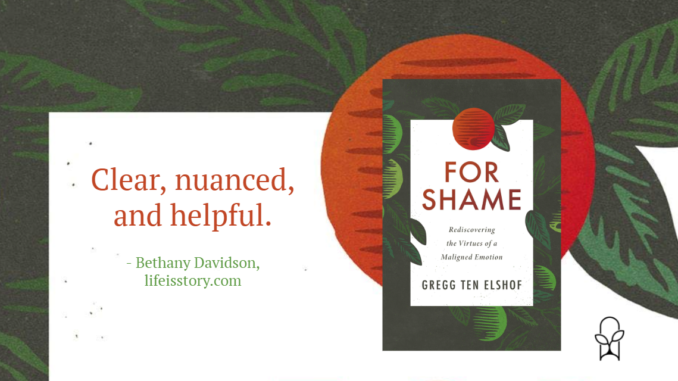
Published by Zondervan on August 31, 2021
Genres: Non-Fiction, Christian Life, Theology
Buy on Amazon
Goodreads

Shame is bad. Too often it cripples and silences victims of other people's shameful behavior, and research has demonstrated clearly the damaging effects of shame on our emotional wellbeing. In recent years a mini-industry of bestselling books, TED Talks, and popular therapies has emerged to free people from deleterious shame.
And yet, a place for shame remains. Some behavior is shameful, and sometimes we ought to be ashamed by wrongs we've committed. Eastern and Western cultures alike have long seen a social benefit to shame, and it can rightly cultivate virtues both public and personal. So what are we to make of shame?
In For Shame, philosopher and author Gregg Ten Elshof examines this potent emotion carefully, distinguishing between it, embarrassment, and guilt and carefully tracing the positive role shame has played historically in contributing to a well-ordered society. While casting off unhealthy shame is always a positive, Ten Elshof demonstrates the surprising, sometimes unacknowledged ways in which healthy shame is as needed as ever. On the other side of good shame, he argues, lie virtues such as decency, self-respect, and dignity--virtues we desire but may not realize shame can grant.
So perhaps shame is good--or better put, a certain kind of shame can yield unexpectedly good gifts.
In this short, accessible philosophical reflection, Gregg Ten Elshof clarifies the meaning of shame and encourages his readers to recognize its value within society. He communicates from the beginning that he does not want to discourage people who struggle with undue and harmful shame, but that our current social discourse against shame risks us losing a meaningful category for discussing our emotional lives and managing life within society. He presents evidence for the historic role of honor/shame dynamics in the West, showing that this is not only an Eastern construct, and he warns that if we reject all sense of shame in the West, we will lose its appropriate benefits. Shame, like physical pain, can alert us to the fact that something is wrong.
The Meaning of Shame
He explains that felt shame is the experience of feeling socially discredited among people whose opinions you value. He argues that this plays an important role in society, and delves into the variances between guilt, shame, and embarrassment. This book can occasionally become repetitive, but the reinforcement can help people start thinking of these categories in clearer, less conflated ways. For Shame: Rediscovering the Virtues of a Maligned Emotion provides a solid argument for why shame plays a legitimate and needed role in human relationships, and Elshof also points out that when people experience shame unjustly, we need to engage with the people and norms causing their shame, not the feelings themselves. For example, when someone who has a disability or has experienced sexual assault feels shamefully discredited in society, the problem is society, not their feelings.
Even though For Shame deals with abstract philosophical concepts and draws on the author’s Christian faith, it is accessible for academic and general readers from different belief backgrounds. Elshof uses clear, precise language, defines key terms, and illustrates abstract concepts with real-life illustrations. The book is also concise, at fewer than 150 pages, and non-academics could read it to help them understand the twisted dynamics behind the anti-shame messages and endless public shaming that they see online. Elshof keeps this book realistic and applicable, and the last chapters address some of the ways that we see shame run amok in public discourse today. Even though Elshof argues that shame plays a positive purpose in human society, he denounces shaming as an activity and provides alternative ideas for how people can resolve issues without assassinating someone else’s character in larger social groups or online.
One Critique
Overall, I found this book very clear, helpful, and nuanced. However, the reflection about race near the end leaned too much into identity politics for my taste. I understand and agree with Elshof’s points about how white men have more opportunities and paths to success, but he flattens identity categories to make it sound like every white man has had his same opportunities, and like every women and/or person of color is inherently a victim who struggles to achieve.
I had hoped that Elshof would address race, since collective shame is so much more appropriate for white people to feel than collective guilt, but he doesn’t address the issue in collective terms. Instead, he just focuses on his personal realizations, and he does so in a way that oversimplifies important issues. He doesn’t acknowledge the ways that marginalized people’s experiences vary widely based on their individual life experiences, and he does not acknowledge that many white men struggle to achieve because of obstacles that have nothing to do with race or gender. Ultimately, even though this was only a brief section, it reflects a missed opportunity and could frustrate readers who fall outside of its generalizations.
Conclusion
Elshof writes clearly and persuasively about the power and necessity of appropriately felt shame, removing the fog around important terms that people tend to use interchangeably. I would recommend this book to people who are concerned by sweeping, indiscriminate anti-shame messages in modern Western culture, but I would also recommend it to people who feel weighed down with shame. It might seem that this book would be more depressing than helpful to someone who struggles with shame, but it can help them clarify their experiences and understand the cultural and social roles of shame instead of just seeing it as a faulty or bad emotion. Overall, I found this book very insightful and helpful, and I am glad that I read it.
